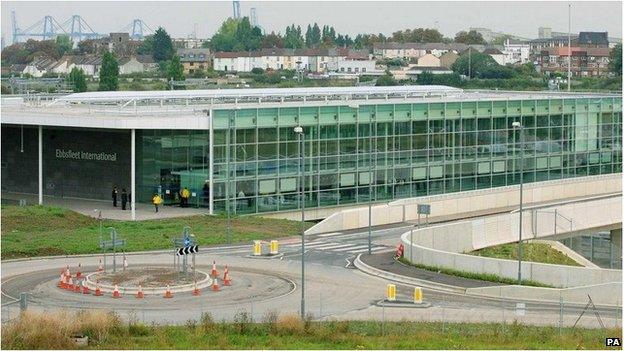15,000-home garden city to be built at Ebbsfleet
- Published
- comments

Ebbsfleet already has a station on the high-speed rail line from London to continental Europe
A garden city with an initial 15,000 homes will be built at Ebbsfleet in Kent, George Osborne has announced.
The chancellor told the BBC's Andrew Marr Show the site was chosen because there was "fantastic" infrastructure and it was in south-east England where pressure on housing has been high.
He said local people wanted to see regeneration of the area.
Labour suggested an existing plan had been re-announced. The Lib Dems said it was a "massive Tory U-turn".
Speaking ahead of his Budget on Wednesday, Mr Osborne said the government's Help to Buy scheme would also be extended until the end of the decade.
'Cuts through obstacles'
Explaining the decision to choose Ebbsfleet rather than richer parts of the country, Mr Osborne said: "In Ebbsfleet there is the land available, there is fantastic infrastructure with the high speed line.
"It's on the river, it's in the south-east of England where a lot of the housing pressure has been.
"And crucially you've got local communities and local MPs who support the idea.
George Osborne said the government's initial plan was to build 15,000 new homes in Ebbsfleet
"We're going to create an urban development corporation so we're going to create the instrument that allows this kind of thing to go ahead and cuts through a lot of the obstacles that often happen when you want to build these homes.
"There are already some homes being built on the site, so progress was under way, but it was on a much, much smaller scale and with much less ambition than what I'm setting out today."
Ebbsfleet has a stop on the high-speed rail line to the Channel Tunnel.
'Proper infrastructure'
Gareth Johnson, Conservative MP for Dartford, said he "very much welcomed" the chancellor's announcement.
"The Ebbsfleet Valley has been a source of great frustration for many years," he said.
"Despite the efforts of the council and central government, we've never got the development we want to see in the area."
He said attempts had been made to build new homes at Ebbsfleet since 1996.
Planning permission was granted for about 6,000 new homes at Eastern Quarry, near Ebbsleet station, in 2007, but nothing was done, he added.
"For whatever reason a developer has not been forthcoming and the recession didn't help," Mr Johnson said.
"What this announcement does is enable the proper infrastructure to be put in place."
London mayor Boris Johnson tweeted, external that the plans were "great news" for London, for jobs, growth and the UK economy.
In 2012, government ministers, three Kent councils and developer Land Securities agreed plans for about 22,600 new homes to be built in Kent Thameside in Ebbsfleet over 20 years.
Conservative Party chairman Grant Shapps said the development had been stuck on the drawing board for "a whole decade".
Three hundred homes have been built since planning permission was first granted.
Shadow chancellor Ed Balls said it was "too little too late".
He said Labour wanted "an objective of more than 200,000 new homes a year by the end of the decade".
"Labour is saying we should match Help to Buy with Help to Build," he said.
"What the chancellor has done today is re-announce an old policy. It's not enough and he should do more."
'Suppressed report'
Tim Farron, president of the Liberal Democrats, said the announcement would "barely scratch the surface" of the 300,000 homes a year that were needed.
He previously accused the Conservatives of suppressing a report recommending new garden cities.
The Conservatives denied any delay and said plans would be outlined for 2015.
Sir Merrick Cockell, chairman of the Local Government Association, said the creation of a separate quango to oversee the development was unnecessary.
He said residents would be concerned that the unelected body could have the power to make local decisions about investment, planning and transport.
A Treasury spokesman said the homes announced in 2012 related to all the housing in the Dartford area.
He said the plans announced by the chancellor would cover three core sites - Eastern Quarry, Ebbsfleet station and Swanscombe peninsula, which had a capacity for 15,000 homes.
The concept of garden cities was developed by the liberal social reformer Sir Ebenezer Howard. In his book "To-morrow: A Peaceful Path to Real Reform", published in 1898, he proposed cities of 30,000 people that were self-sufficient and ringed by an agricultural belt.
Garden cities were a response to overcrowding and squalid living conditions in cities following the Industrial Revolution. They were intended to combine the best of urban life with access to nature.
- Published11 January 2014
- Published29 August 2012
- Published29 August 2012
- Published20 June 2011